Please find below information about the Sacramental life of our Parish.
Infant Baptism
Preparation courses for the parents take place in Holy Trinity Parish Hall usually three times a year. You will be invited to attend one once your “Request for Infant Baptism” form is completed, returned to Father Andrew after any of the weekend Masses and countersigned by him.
First Reconciliation and First Holy Communion
Confirmation
RCIA (Journey in Faith)
If you are an adult and not a Catholic or have not received all the sacraments of initiation (Baptism, Holy Communion & Confirmation), the Journey in Faith course runs every year from October to April to prepare individuals to receive the Sacraments of Initiation or be received into the Church.
The course is also open to anyone who would just like to learn some more about the Catholic Faith.
‘Journey in Faith’ forms are available from the back of each church to be returned by 6th October.
Marriage
A couple who wish to marry should speak Fr Andrew at least six months before their proposed wedding date, and should not make any other arrangements concerning their wedding until they have spoken to him.
Please click below to see sample versions of the Sacramental Preparation Forms. These are only sample versions so please ensure you complete one of the forms available from the back of our three Churches.
The Catholic Church accepts seven Sacraments which ‘touch all the stages and all the important moments of Christian life’ (Catechism of the Catholic Church 1210) and can be classified in 3 groups:
Sacraments of Initiation: Baptism, Confirmation, and Eucharist
Sacraments of Healing: Reconciliation and Anointing of the Sick
Sacraments at the Service of Communion: Holy Orders and Matrimony
The Sacraments, instituted by Christ and entrusted to the Church, are the means by which divine life is dispensed to humanity. When a child is baptised or a couple is married there is an effect, however, the sacraments are not ‘magic’ meaning that regardless of what we do or how we live they universally bear fruit. Rather, they truly bear fruit when received with the right dispositions, preparation and intention (CCC 1131).
Just as our Lord Jesus Christ put on human flesh to draw close to us, it is fitting that the Sacraments are also expressed through tangible things, such as bread, wine, water, oil, and the human voice. The Church – as the Body of Christ – dispenses these Sacraments for the life of her members (CCC 1117-1118).
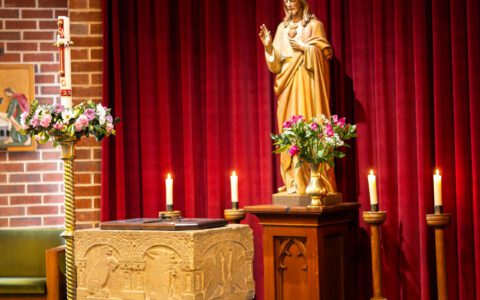
Baptism
Holy Baptism is the basis of the whole Christian life, the gateway to life in the Spirit, and the door which gives access to the other sacraments – CCC 1213
For Catholics, the Sacrament of Baptism is the first step in a lifelong journey of commitment and discipleship. Baptism is the first sacrament of Christian initiation. Through Baptism we are freed from sin and are embraced into the family of the Church.
The origin and foundation of Christian Baptism is Jesus. Before starting his public ministry, Jesus submitted himself to the baptism given by John the Baptist. The waters did not purify him; he cleansed the waters. because he was totally faithful to the will of his Father and free from sin, Jesus did not need to be baptised However, he wanted to show his solidarity us and to reconcile us to the Father.
By commanding his disciples to baptise all nations, he established the means by which people would die to sin – Original and actual – and begin to live a new life with God.
Baptism transforms us. It marks our soul for life and eternity. In baptism, the Holy Spirit moves us to answer Christ’s call to holiness. In baptism, we are asked to walk by the light of Christ and to trust in his wisdom. We are invited to submit our hearts to Christ with ever deeper love.
Although as Catholics we believe that every human being is made in the image and likeness of God, it is through baptism we become sons and daughters of God and are brought into that most mysterious communion with Father, Son, and Holy Spirit.
The Rite of Baptism
Through Baptism we are freed from sin and reborn as sons and daughters of God; we become members of Christ, are incorporated into the Church and made sharers in her mission: ‘Baptism is the Sacrament of regeneration through water in the Word.’’ Catechism of the Catholic Church, 1213
The Rite of Baptism involves immersing the candidate in water or pouring it over his/her head, while invoking the Name of the Holy Trinity: Father, Son, and Holy Spirit (CCC 1278).
If you are not Catholic but have received Baptism as described above, we consider your baptism valid. So, you will not be baptised again if you choose to join the Catholic Church. Rather, you will be initiated into full communion with us through the Sacraments of Confirmation and Eucharist.
Want to receive the Sacrament of Baptism?
Baptism is a Sacrament of faith, and the Church asks for a serious and loving commitment by the parents and godparents of a child to live the life of the Sacraments. The baptism ceremony for adults and teens is similar to baptism of children except that you make the baptismal promises yourself. Instead of godparents, adults have sponsors whose role is to encourage you in the Catholic Faith.
For children aged 6 and below:
- At least one parent should be a practising Catholic
- Parent(s) to attend Infant Baptism preparation sessions at the parish
- Either one godparent, or two (one male and one female), who is a confirmed Catholic over the age of 16
Contact your parish for more information and assistance in your preparations. If you are seeking baptism in a parish other than the one in which you live, you ought to contact your own parish priest in the first instance.
For children aged 7 to 18:
- Contact your parish priest for more information
For adults:
If you would like to be baptised as an adult you will need to participate in some instruction, individually or through the Rite of Christian Initiation of Adults (RCIA). Traditionally adult baptisms take place during the ceremony of the Easter Vigil. In some parishes, therefore, you might be asked to wait for Easter for Baptism.
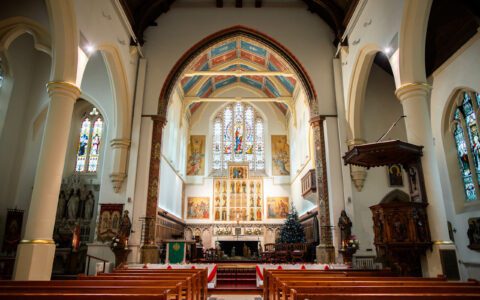
Confirmation
Baptism, the Eucharist, and the sacrament of Confirmation together constitute the ‘sacraments of Christian initiation’, whose unity must be safeguarded. It must be explained to the faithful that the reception of the sacrament of Confirmation is necessary for the completion of baptismal grace. For ‘by the sacrament of Confirmation, [the baptized] are more perfectly bound to the Church and are enriched with a special strength of the Holy Spirit. Hence they are, as true witnesses of Christ, more strictly obliged to spread and defend the faith by word and deed’ – CCC1285 (cf. Lumen Gentium 11)
At Baptism, we begin a life-long journey and a way of life. At Confirmation, the graces received in Baptism are sealed with the reception of the seven Gifts of the Holy Spirit. The words that Jesus shared with his disciples at Pentecost apply to each one of us at Confirmation, you will receive power when the Holy Spirit has come upon you; and you will be my witnesses (Acts 1:8).
The Sacrament of Confirmation is typically received by children, who are at least twelve years of age, baptised, and prepared with the help of the parish community. Confirmation is administered by the Bishop and, on rare occasions, by a priest delegated by the Bishop.
Anointed and Gifted
The prophets of the Old Testament foretold that God’s Spirit would rest upon the Messiah to sustain his mission. Their prophecy was fulfilled when Jesus, the Messiah (Christ), was conceived by the Spirit and born of the Virgin Mary. The Holy Spirit descended on Jesus on the occasion of his baptism by John. Jesus’ entire mission occurred in communion with the Spirit. Before he died, Jesus promised that the Spirit would be given to the Apostles and to the entire Church. After his death, he was raised by the Father in the power of the Spirit.
The Sacrament of Confirmation confers ‘the full outpouring of the Holy Spirit as once granted to the apostles on the day of Pentecost (CCC 1302)’. As such, Confirmation is ordinarily administered by the bishop, who is the successor of the apostles.
Confirmation deepens our baptismal life that calls us to be missionary witnesses of Jesus Christ in our families, neighbourhoods, society, and the world.
In the Sacrament of Confirmation, we receive the gifts of the Holy Spirit: wisdom, knowledge, right judgment, understanding, courage, piety, and fear of the Lord. In this way, the Sacrament of Confirmation completes the Sacrament of Baptism (see CCC 1303).
The Rite of Confirmation
In the Rite of Confirmation, the Bishop traces the Oil of Holy Chrism on the candidate’s forehead in the shape of the cross. This recalls Christ’s title as ‘the Anointed’. In the Old Testament, we also read about the anointing of priests, prophets, and kings: Then Samuel took the horn of oil, and anointed him in the presence of his brothers; and the spirit of the Lord came mightily upon David from that day forward (1 Samuel 16:13)
In Baptism, we receive an anointing (which cleanses and strengthens us for the Christian life), the anointing then received in Confirmation acts as a consecration, a setting apart for mission (CCC 1294).
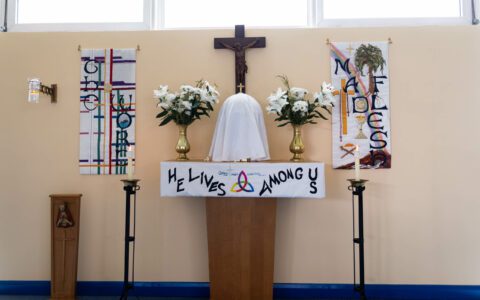
Eucharist
The Eucharist is ‘the source and summit of the Christian life.’ The other sacraments, [and indeed all other aspects of the Church’s life], are bound up with the Eucharist and are oriented toward it. For in the blessed Eucharist is contained the whole spiritual good of the Church, namely Christ himself’ – CCC 1324
Reception of the Eucharist for the first time completes a person’s reception of the Sacraments of Initiation into the Christian life. The Eucharist brings about our intimate union with Jesus Christ because it is a sacrament of love, with his Church because it is a sign of unity and with the very presence of the risen Christ who shares his life with us.
As Jesus told us, ‘Those who eat my flesh and drink my blood abide in me, and I in them’ (John 6:56).
The Sacrament of the Eucharist, which we receive at Mass, is the real physical and spiritual presence of Jesus Christ. As Catholics, we take Jesus at his word when he says ‘This is my body, which is given for you’ (Luke 22:19). Another way of putting this is that we believe in the Real Presence. We believe that Jesus Christ is ‘present in a true, real, and substantial manner: his Body and his Blood, with his soul and his divinity (CCC 1413).’ When we compare the man who walked the earth some two thousand years ago with the consecrated Bread and Wine, the only difference is the outward appearance, the underlying reality is Jesus Christ our Lord.
Such is the intimacy that Christ desires with each one of us!In this union with Christ, we also have communion with all our brothers and sisters spread throughout the world (CCC 1398).
The Church celebrates the sacrifice of the Mass daily, but Catholics are obliged only to attend Mass on Sundays and on other Holy days of obligation. For this is how we observe the Lord’s Day, by gathering around his table as one family.
Want to receive the Sacrament of the Eucharist (Holy Communion)?
You have been baptised or received into the Catholic Church
Children should have made their First Holy Communion, this typically takes place around the age of 7 years old after a period of preparation in the parish and in the home.
You have fasted for one hour beforehand. (Water and medicine do not break your fast.)
You are not in an irregular marital situation, e.g. civilly married without Church endorsement
You have not knowingly committed serious sins since your last confession. All serious sins must be absolved through the Sacrament of Reconciliation before receiving the Eucharist
If you are cannot receive the Eucharist for any reason, you may make a Spiritual Communion asking God to grant you the graces of the Sacrament.
‘When we receive Holy Communion, we receive our joy and our happiness … The good God, wishing to give Himself to us in the Sacrament of His love, gave us a vast and great desire, which He alone can satisfy’ (St John Vianney).
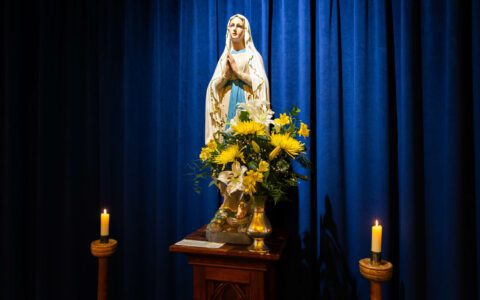
Reconciliation
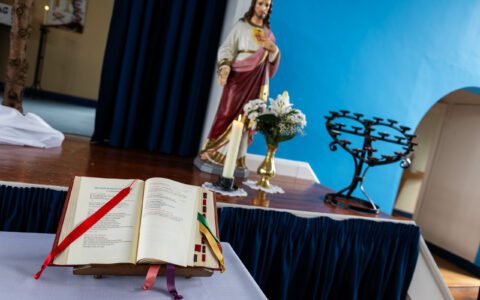
Anointing of the sick
Illness can lead to anguish, self-absorption, sometimes even despair and revolt against God. It can also make a person more mature, helping him discern in his life what is not essential so that he can turn toward that which is. Very often illness provokes a search for God and a return to him – CCC 1501
Understanding the Anointing of the Sick: The Sacrament of Anointing of the Sick is given with the hope that, if it is God’s will, the person may be physically healed of their illness. However, the primary effect of this sacrament is spiritual healing. The sick person receives the Holy Spirit’s gift of peace and courage to face the difficulties that come with serious illness or the frailty of old age.
Jesus’ Healing Touch: In the Sacrament of Anointing of the Sick, administered by a priest, it is Jesus who reaches out to heal the sick. This sacrament reflects Jesus’ mission to conquer sin and death through his death and resurrection, offering comfort and hope to those who are suffering.
When to Receive the Sacrament: The Sacrament of the Sick is typically administered in situations involving an immediate prospect of surgery, significant age, or danger of death. However, it is not necessary to wait until the person is at the point of death to receive the sacrament. A careful judgment about the seriousness of the illness is sufficient, making it appropriate for both children and adults.
Sacrament of the Sick in Scripture: The Sacrament of the Anointing of the Sick is first mentioned in Mark 6:13, where the apostles anointed many sick people with oil and healed them. James elaborates in his epistle: “Is any among you sick? Let him call for the presbyters of the Church, and let them pray over him, anointing him with oil in the name of the Lord; and the prayer of faith will save the sick man, and the Lord will raise him up; and if he has committed sins, he will be forgiven.” – James 5:14-15
Receiving the Sacrament of Anointing of the Sick
To receive the Sacrament of Anointing of the Sick, you must meet the following criteria:
- Baptised or Received into the Catholic Church: You must be a baptised Catholic or have been received into the Catholic Church.
- Condition of Severe Illness: You can receive the Anointing of the Sick whenever you are severely ill, and you can receive it more than once.
- Non-Catholic Christians: Non-Catholic Christians can request the Anointing if they are in danger of death and cannot approach a minister from their own community.
If you or someone you know needs this sacrament, you are encouraged to contact the parish office. The sacrament provides spiritual strength and peace during times of illness and can be a profound source of comfort and grace.
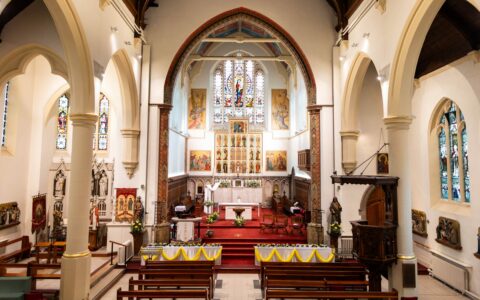
Holy Orders
Continuing the Apostolic Ministry: Through Holy Orders, the Church perpetuates the ministry entrusted by Jesus Christ to his apostles, carrying it forward from generation to generation until the end of time (CCC 1536).
In Scripture, we read of St. Paul conferring the gift of the Holy Spirit and the faculties of this apostolic ministry to Timothy through the laying on of hands (1 Timothy 4:14). The Catholic Church, alongside the Orthodox churches, has maintained this tradition of apostolic succession since the first apostles.
Three Degrees of Holy Orders: There are three orders within the Sacrament of Holy Orders: Diaconate (Deacon), Presbyterate (Priest), and Episcopate (Bishop).
Diaconate
Role and Duties: A deacon (Greek: diakonos) is the ordinary minister of Baptism and may lead wedding and funeral services. Deacons also preach at Mass and provide pastoral care. They often take the lead in the charitable works of the parish.
Presbyterate
Role and Duties: In addition to the duties of a deacon, a priest (Greek: presbuteros) may celebrate Mass, hear Confessions, and anoint the sick. With delegation from his Bishop, a priest may also confer Confirmation. Each parish is typically overseen by a priest or a group of priests.
Episcopate
Role and Duties: A Bishop (Greek: episkopos) is a successor to the apostles and holds the fullness of the Sacrament of Holy Orders. Bishops have the authority to celebrate all seven sacraments, with unique responsibilities to ordain priests and deacons and to confer Confirmation as the apostle in the diocese.
Priesthood
The Bible affirms that Jesus Christ is the “one mediator between God and men” (2 Timothy 2:5). This singular priesthood of Jesus Christ is made present through the ministerial priesthood of those called to the presbyterate. St. Thomas Aquinas noted, “Only Christ is the true priest, the others being only his ministers” (CCC 1545).
The lay faithful participate in another kind of priesthood, the common priesthood, by virtue of their baptism. The ministerial priesthood serves the common priesthood, aiming to unfold the baptismal grace of all Christians (CCC 1547).
In the Roman tradition, priests observe celibacy for the sake of the kingdom of heaven (Matthew 19:12). They consecrate themselves with undivided hearts to the Lord and his work (1 Corinthians 7:32), dedicating themselves entirely to God and his people (CCC 1579).
Ordination to the priesthood is a divine call and gift. Jesus reminded his apostles to pray for labourers for the harvest. Those who seek priesthood respond generously to God’s call, echoing the prophet’s words, “Here I am, send me” (Isaiah 6:8). This call is recognised through the discernment of the candidate’s vocation by those in charge.
Becoming a Priest
The journey to priesthood involves a strong sense of calling and extensive preparation through seminary training. Post-ordination, priests have opportunities for further training and formation provided by the diocese.
Becoming a Permanent Deacon
Requirements: You must be at least 25 years old and willing to commit to lifelong celibacy if unmarried, or at least 35 years old if married, with your wife’s consent. You must be a practicing Catholic male who has received the sacraments of Christian initiation (Baptism, Confirmation, Holy Eucharist). If discerning a call to the diaconate, please contact the parish office.
Becoming a Priest
Requirements: You must be an unmarried male, a practicing Catholic who has received the sacraments of Christian initiation, and accepted into a formation program by your bishop. Seminarians can be ordained as deacons at 23 and must wait six months before ordination to the priesthood.
Becoming a Bishop
Requirements: You must be a priest, at least 35 years old, and have received a letter of appointment from the Pope.
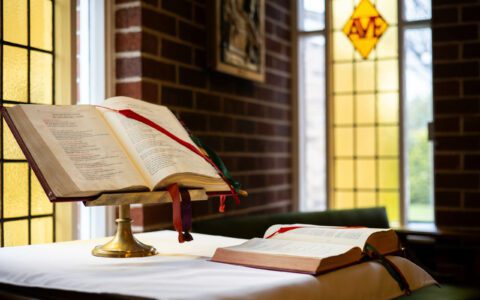
Holy Matrimony
The Sacrament of Matrimony signifies the union of Christ and the Church. It gives spouses the grace to love each other with the love with which Christ has loved his Church; the grace of the sacrament thus perfects the human love of the spouses, strengthens their indissoluble unity, and sanctifies them on the way to eternal life – CCC 1661
Marriage in Scripture: Scripture begins with the creation and union of man and woman and culminates with “the wedding feast of the Lamb” (Revelation 19:7, 9). Jesus inaugurated his public ministry at the wedding of Cana, transforming water into wine. This underscores the profound significance of marriage, revealing something about God’s relationship with humanity. Throughout Scripture, marriage is frequently referenced, highlighting its divine origin, purpose, and renewal through the covenant made by Jesus with his Church. Man and woman were created for each other, reflecting God’s design.
The Covenant of Marriage: The Sacrament of Marriage is a covenant, which transcends a mere contract. A covenant signifies a deep, personal relationship. In marriage, this covenant denotes the relationship between husband and wife—a permanent union wherein they can know and love each other and God. The celebration of marriage is a liturgical act, ideally conducted in a public liturgy within the church. Catholics are encouraged to celebrate their marriage within the Eucharistic Liturgy.
A Sacrament of Love: Through their marriage, couples witness Christ’s spousal love for the Church. One of the Nuptial Blessings in the liturgical celebration of marriage articulates this: “Father, you have made the union of man and wife so holy a mystery that it symbolises the marriage of Christ and his Church.”
In Holy Matrimony, husband and wife are called to mirror Christ by giving themselves in a manner that is free, total, faithful, and fruitful. The matrimonial union is indissoluble (Matthew 19:4-6, Mark 10:7-9), reflecting Christ’s unwavering love for us despite our shortcomings.
Marriage calls couples to be open to life, welcoming it as a gift and bringing it into the world. God designed marital love as a means of expressing intimacy and openness to the gift of life. Marriage is the institution through which children are welcomed, loved, and come to know their heavenly Father. Through marriage preparation, the Church helps couples discern this beautiful vocation, which involves growing in unity and cooperating with God in creating His children.
What Makes a Catholic Marriage?
- Sacredness: Marriage is not merely a human agreement; it is a covenant before and under God (Genesis 2:22).
- Intimacy: Marriage unites a man and woman in a “one-flesh” union (Genesis 2:23-25), involving “leaving” one’s family and “being united” to one’s spouse in unconditional, selfless, and life-giving love.
- Mutuality: Marriage is a relationship of free self-giving between a man and a woman (Ephesians 5:25-30), centred on the well-being of the other, requiring steadfast love, devotion, and forgiveness.
- Exclusiveness: Marriage is a permanent, sacred, intimate, and exclusive relationship (Genesis 2:22-25; 1 Corinthians 7:2-5), with no other human relationship interfering with the marriage commitment.
Want to Receive the Sacrament of Holy Matrimony (Marriage)?
- Eligibility: You must be free to marry. Those in irregular marital situations (e.g., civil divorce) should first seek advice from their parish priest.
- Notice Period: Diocesan policy typically requires at least six months’ notice of marriage at the parish closest to the Catholic party. This allows sufficient time for necessary paperwork and preparation.
- Preparation Course: Attend a marriage preparation course approved by the Church to ensure readiness for this sacrament.
For more information or guidance, contact your local parish office. The Church is committed to supporting couples in understanding and living out the vocation of marriage, ensuring it is a source of grace and fulfilment.
